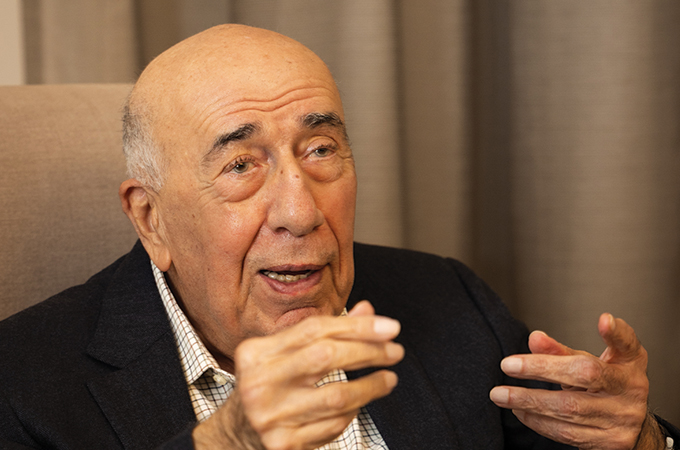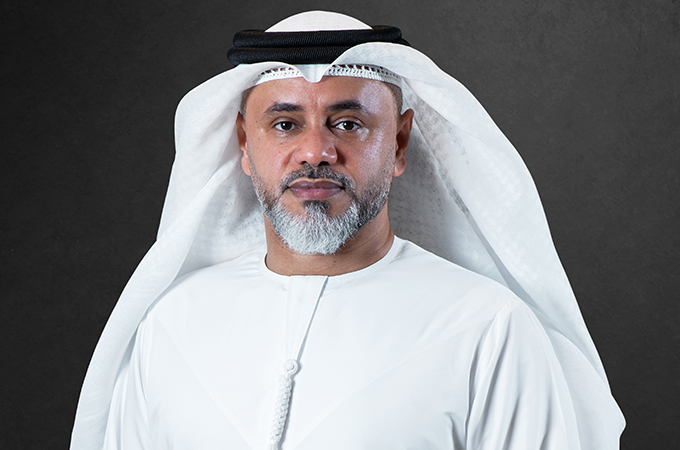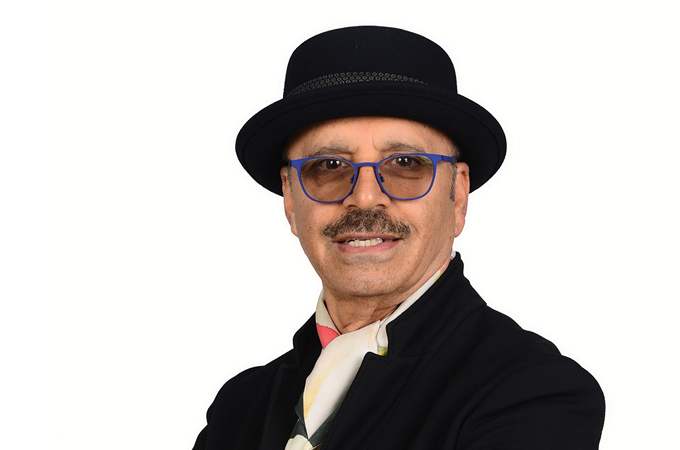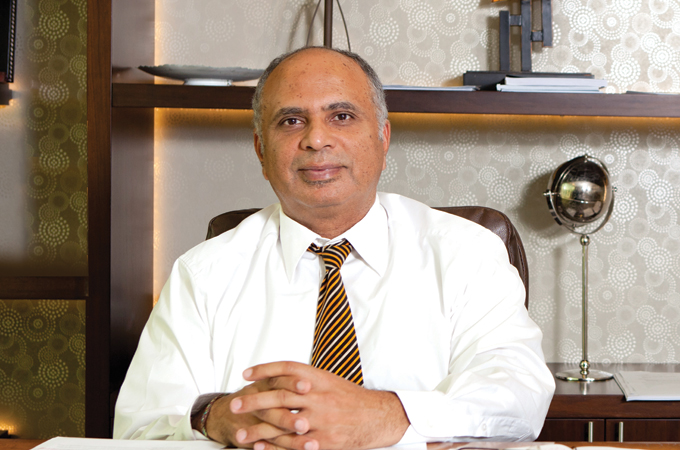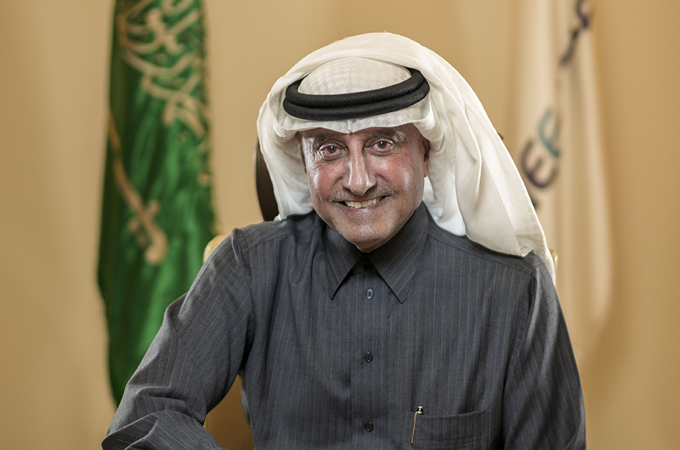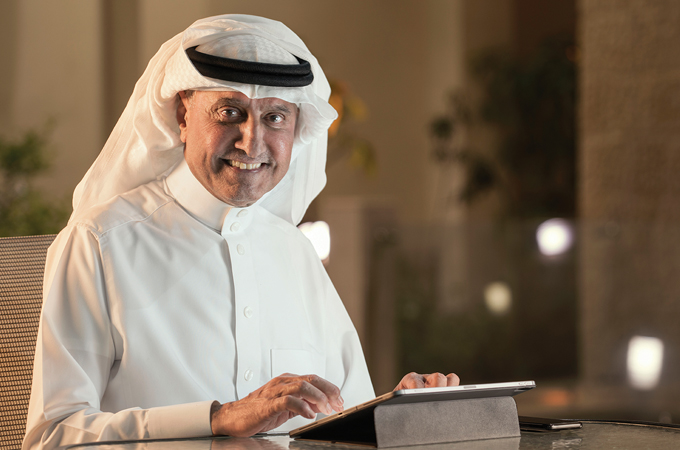Winter 2017
Business, philanthropist and respected commentator Mishal Kanoo offers sage advice on how to deal with the constant forces of change, while philosophising on the meaning of art and beauty
In many respects, Mishal Kanoo needs no introduction. The Chairman of Kanoo Group, one of the Gulf’s largest, independent family owned group of companies, he is considered one of the region’s most successful businessmen.
He is also something of a doyen of social media and as one of the Arab world’s more respected commentators, is in much demand as an independent thinker on media networks and the regional speaking circuit.
Mishal operates out of the Kanoo Group’s office in Bur Dubai in the UAE. This is the city’s original commercial heart, a district where trading families such as Kanoo built their reputations and made some of their money. It is distinctly ‘old money’ Dubai, and the office pays homage as such, with photographs documenting the family’s glorious contribution to the region’s decorated history.
Yet Mishal is anything but a man stuck in the past. As Chairman of Kanoo Group he is now steering his charges into the future, albeit a future that looks increasingly uncertain for the world. It seems only fitting, then, that conversation should begin briefly with the new US president, a man like Mishal who is well accustomed to the power of media to inform and influence.
“Most people in opposition are idealists, and when they are in power they are pragmatists. I don’t see Donald Trump being any different,” Mishal tells Arabian Knight, fresh from a TV interview with Bloomberg News on the subject.
ADAPTING TO CHANGE
He acknowledges the winds of change blowing through Western politics.
“It does open up the thought that, if Trump happened and Brexit (the UK’s exit from the European Union) happened, then Marine Le Pen (the far right politician) could happen in France, where the next (presidential) election is due to be held,” Mishal comments.
It is, however, in an environment of change that the Kanoo business empire now finds itself. The shifting sands caused not only by global economic distress and geopolitical turbulence in recent years but also by the pace of digitalisation has challenged all GCC family businesses to adapt to survive and thrive. For Mishal, who assumed the chairmanship of the group (which is part of Yusuf Bin Ahmed Kanoo, the diversified conglomerate established in Bahrain in 1890) just over a year ago, a restructuring plan is proceeding rapidly.
“The changes (that are happening in the company) are moving forward more quickly than anyone had anticipated,” he explains.
“GCC family businesses have no choice but to adapt. Those businesses in the retail space are finding it a lot harder, because the pace of change in that sector is so much quicker. Their business is no longer geographically confined to this region.
“How many bookstores in this region can compete with Amazon? Other than an impulse purchase, would I go to a local bookstore? It’s a challenge.”
It is perhaps no surprise that Mishal, who describes himself as a contrarian – defined as one who rejects popular opinion – finds himself challenging conventional wisdom about economic dynamics, impacts and forecasts in a volatile world.
“I’m not a contrarian for the sake of being a contrarian,” he clarifies.
“But most of the economic indicators we see are retro indicators. When you are at the tipping point on a roller coaster, your head tips upwards the moment the roller coaster goes down due to forces you can’t control. So when markets are down we tend to look up first before we get hit by the downcycle. It’s the same on the way up – your head is pushed down.
“Right now we are on the second part of the roller coaster, where your head is being pushed down and you think everything is negative. That’s usually the time when things are going to flip up. And (if your head is down) you are going to be playing catch up.
“Everyone says our region is in dire straits. We are not. In the first quarter of 2016 the oil price was $27 per barrel. It is up more than 100 per cent since then. Relative to where we were we are not in a bad situation. Relative to $115 (per barrel) oil we are, but $115 was an artificial position.
“What is more interesting to me is that governments in the region could be playing up the situation. Because for the first time in a long time this gives them the opportunity to cull the excesses that have accumulated over the last few years. When things are looking bad, people are willing to accept something less. I think the region’s governments are playing on that, which I think is smart,” he adds.
BUSINESS MIND
Mishal Hamed Kanoo was born in Bahrain in the late 1960s. His father Hamed, seeking to expand the trading empire beyond its roots in Saudi Arabia and Bahrain, came to the UAE in 1967 to set up the Kanoo Group, covering both the UAE and Oman markets. Today, the group has diverse interests in shipping, travel, machinery, logistics, property, energy, retail and commercial activities in both countries.
Mishal, having cut his teeth in the family business as an Assistant Shipping Manager in his early twenties following his higher studies in the United States, chose initially to broaden his academic and career experience, securing a second MBA from the American University of Sharjah and working for a time as an auditor at the Dubai office of Arthur Andersen.
In 1997, he returned to the Kanoo Group fold as Deputy Chairman, a post he held until 2015 when he became Chairman.
He is also involved at board level with a number of organisations both in the region and further afield, where his vision, acumen, contacts and experience are highly valued.
For a man with such a glittering track record in business, and as something of a household name in the Arab world, it seems curious to hear that he is not given to personal platitudes and plaudits, and believes social media in particular does not have to be the narcissistic tool it is sometimes accused of being.
“I post articles (on social networks) that I have written and that are of interest to me, but which are not full of praise for me. I don’t do it to get ‘Likes’. With social networking you have different platforms. You have the generic, which is Facebook. You have Twitter, which is a quick shot like an espresso. And you have the narcissistic platform like Instagram.
“And from a business perspective, LinkedIn is the best situation at present because I get the opportunity to interact with experts in their sphere.”
SPIRITUALITY AND LIFE
Although media provides a highly effective platform for Mishal to inform and share his views on subjects as diverse as business, economics, society and politics, his passions inevitably go far deeper. He read religion and philosophy at university in the US, and this academic immersion has played a role in shaping his outlook on life today.
“Religion, not religiosity, is a very important part of anyone’s life,” he acknowledges. “There are times when nothing else can explain something. If you try to look at it from a superficial or earthly perspective, you’ll go crazy. I can’t accept, for example, that there are no repercussions for people who do bad things.”
He believes that, too often today, spirituality is neglected amid the race for fame and fortune.
“We are made up of three things: physical, intellectual and spiritual. Today all we do is feed the physical,” he emphasises.
“Religion in the English lexicon has become the equivalent of philosophy in the Arabic lexicon. Muslims gave the world two things – the Arabic language, and it brought all the philosophies of the world together and shared them. People aspired to be philosophers. Today if you tell someone in Arabic that they are a philosopher it means they talk too much! In English today, if you tell someone they’re religious you’re basically saying they are a fundamentalist or zealot. It has moved from being a positive thing to a negative thing.”
But there is much positive in Mishal’s life for which he is grateful. In keeping with his family’s mission, he is a generous philanthropist, and says he is “inspired” by the knowledge that, every day, there is an opportunity to help change somebody else’s life for the better.
“I don’t mean in some act of grandeur. I mean in day-to-day interactions, perhaps by creating more opportunities (for people).”
He takes this mantra into the workplace, where some 1,200 employees work across the various business divisions of the Group.
“I don’t want to be seen as a good guy. I want to be a good guy. And not for the sake of people praising me. That has never been in my mind. In my mind, the purpose of money is to be utilised to make other people’s lives better. It is a vehicle, not the end.
“Like other families, my family goes out of its way to better people’s lives. But I don’t do this as a marketing campaign (for the company). Yes, I want a good life and to enjoy my life as everyone else strives to do, and if I make money there is no reason why I cannot enjoy life. But the circle starts with myself, my immediate family, my outside family, my community and society. My community doesn’t mean just those in my religion or race. It is who I interact with, regardless of race or background. We all share one trait – we are all humans. The more I give the better I feel.
“Because if you want good things to happen, you need to go and do good things, not pay lip service. I need to help people. I want people’s lives to get better.”
While he is passionate about providing opportunities for people to better their lives, Mishal is also a strong advocate of hard work and productivity in his employees such that everybody benefits.
“I tell my staff that loyalty to me is not longevity. Loyalty to me is productivity. The more you produce for the company, which after all benefits more people, the more loyal you are. You can be here for six months and be productive, and therefore loyal, or you can be here for 30 years and have done nothing.”
LOVE OF ART
Looking around Mishal’s office, it is impossible to escape the ornate surroundings in which we find ourselves. The room is achingly tasteful, with colours that are easy on the eye and, while it implies wealth and a love for life’s finer things and the beauty within them, it is by no means ostentatious. Mishal may be one of the GCC’s most successful, and dare we say famous, businessmen, but his office in downtown Dubai is also a private sanctuary where his passions can be indulged.
The walls in the interview room encapsulate his love of art and aesthetics. He never invests in art as an investment, only for its intrinsic beauty. Mishal is a leading light in the Dubai arts scene and, with Sultan Sooud Al Qassemi and Charles Pocock, founded the city’s Meem Gallery a decade ago to showcase modern and contemporary Arab and Iranian art.
And then there are the references on the walls to the stunning timepieces which he so passionately collects. It is claimed that his watch collection is his second most valuable possession after his property, and he boasts a collection of timepieces including the fine 18-karat gold and enamel automatic wristwatch by Bovet, the Patek Philippe yellow gold, the Jaeger-Lecoultre 18-karat pink gold, and the ultra-thin 18-karat gold and enamel open face keyless lever dress watch by Cartier.
“I collect watches because I can see a brilliance that combines both engineering and art in something I cannot do. But just because I cannot do it does not mean I cannot appreciate it,” says Mishal, puffing on a cigar.
“Some people buy watches as an investment. I don’t. With art and watches, values are fickle. Today I like it, tomorrow I don’t. The watch, the painting, the vintage car... if there are two similar watches, one might sell for more than the other, simply because there is a history associated with it. It may have been worn by a celebrity, or may have featured in a famous photo. You never know how the values can change.
“But if you buy it because it is beautiful, because you love the intricacies, because it is aesthetically pleasing, it doesn’t matter what people think about it, you’ll always enjoy it.”
As the ultimate aficionado, Mishal commissioned exclusive German watch craftsman Jochen Benzinger to create an exceptional, unique timepiece just for him. What emerged was a red gold three quarter skeleton in which Benzinger displayed the Kanoo Group logo on the dial, a black palm tree on a blue background, a hand-engraved, hand-skeletonised and hand-guilloché Unitas 6498 with manual winding movement, two-colour gold plating, flame-blued screws and customer initials.
However Mishal, who is on the judging panel of the annual Middle East ‘Watch of the Year’ Awards, does not have a favourite watch in his collection. “Different watches appeal to me at different times. Some are classy and some are pure simple watches. It depends on the mood.”
MEANING OF BEAUTY
Beauty, of course, is in the eyes of the beholder, but as a thoroughly modern operator in a digital world, does he believe artistic tastes and the value of aesthetics are changing among millennials?
“Tastes will change,” he admits. “Tracey Emin’s neon signs are never going to be art for me, but others may think they are. But aesthetics moves me. Beauty moves me.
“There is a saying of the Prophet: ‘God is beautiful and he loves beauty.’ But how do you define beauty? Scientists have tried.”
Appropriately given the setting and tone of conversation, we conclude the interview on the theme of beauty. I remind Mishal of a quote he once gave to another publication: “In an ugly world where I cannot control anything, spreading a bit of beauty is never a bad thing”.
In what some people would suggest is an ugly world at times today, I ask Mishal if his statement has added resonance.
“We are never in control,” he stresses. “Everyone perceives that they are in control. Even the people in power. But they are not. If you can control the weather then you are in control.
“You’re driving an expensive car, the road is empty, you’re doing 300 kmph. The tyre blows. A dog runs across. You’re not in control. You can’t foresee random things. It’s a cliché but in this world the only certainty is uncertainty.
“What we should be doing is focusing on what we can focus on. Trying to enrich other people’s lives. And if you can make life prettier, why not? There is so much ugliness in this world. So we need to make the world a more beautiful place where people care about one another.
“We’ve gone from a population size at the turn of the century of 1.7 billion to seven billion, touching eight. If we don’t start to learn to play with one another in a nice way, eventually we’re going to start killing one another. Animals kill for food, and to preserve their offspring. We kill for fun, for pleasure. We need to have a little mercy,” he stresses.
Fittingly, he concludes with another saying from the Prophet: ‘Have mercy on the creatures, and the creator will have mercy on you’.



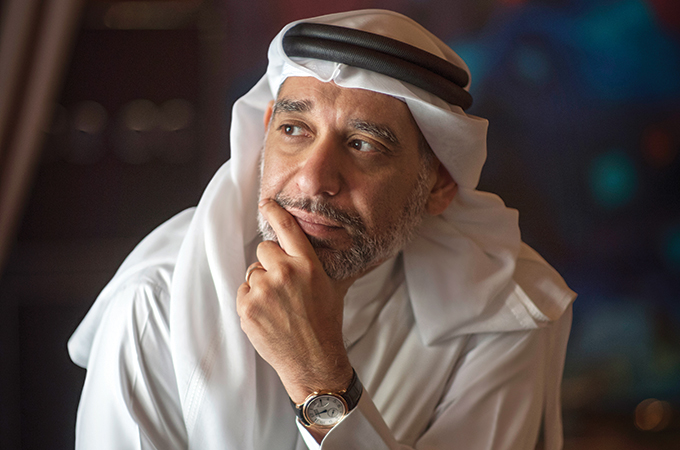
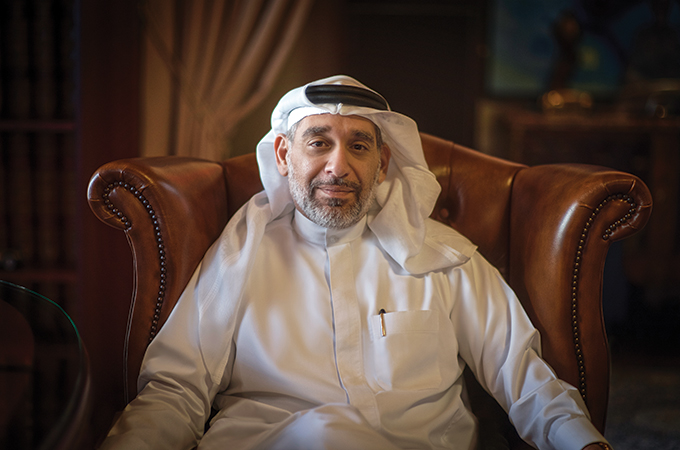
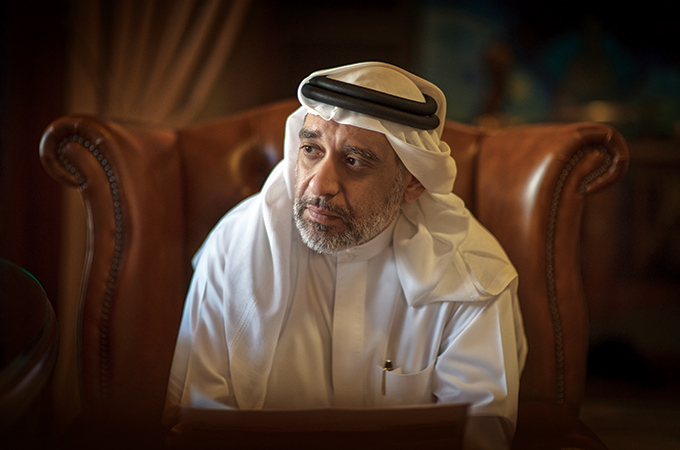
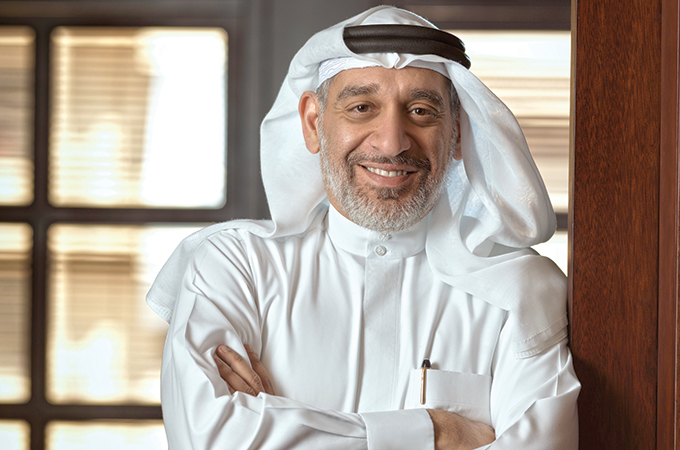
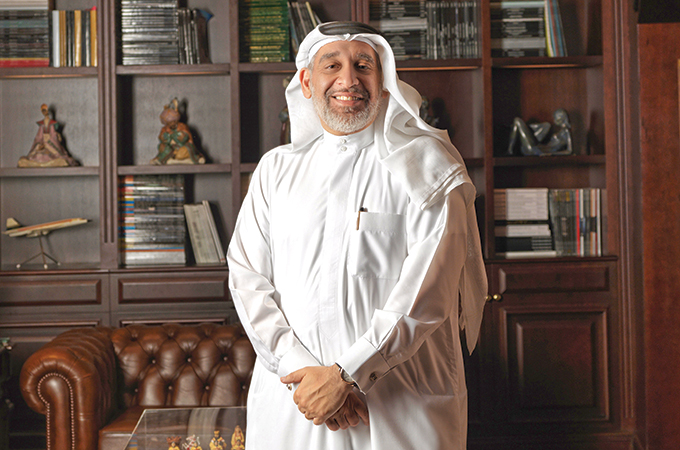
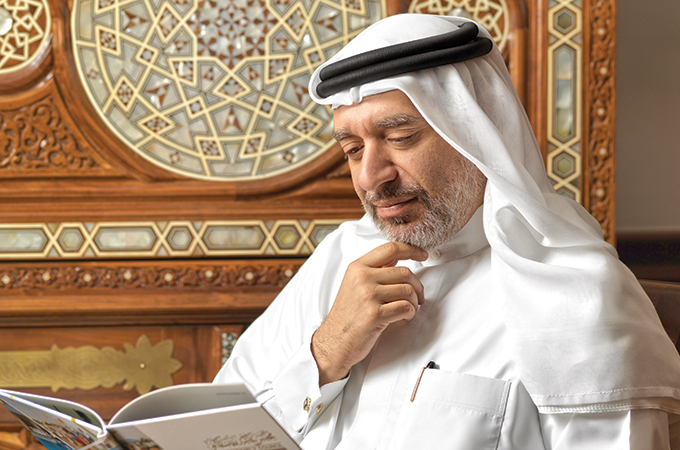
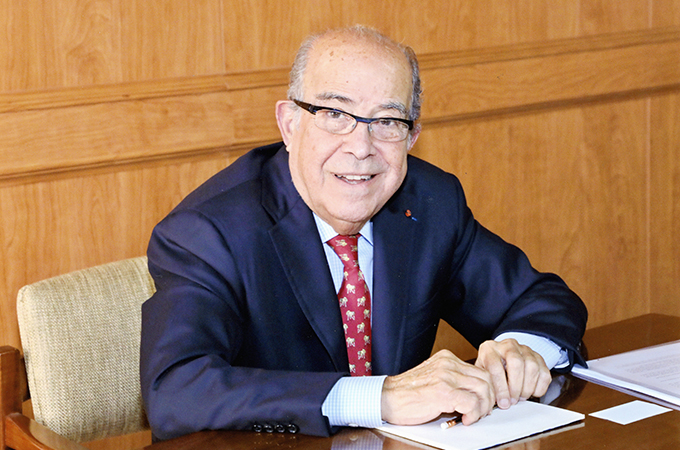
.jpg)
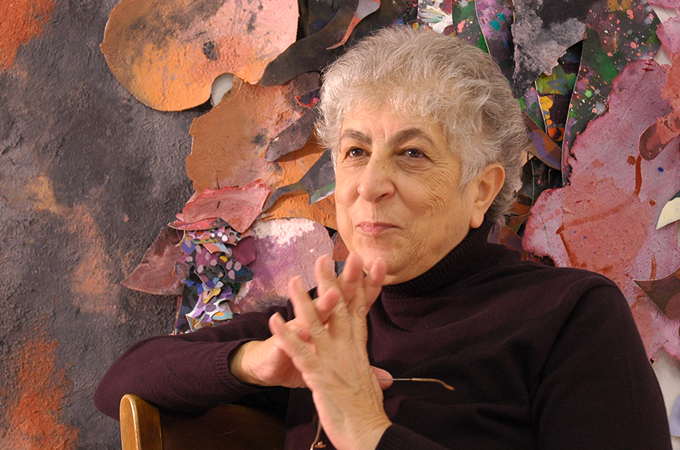
.jpg)
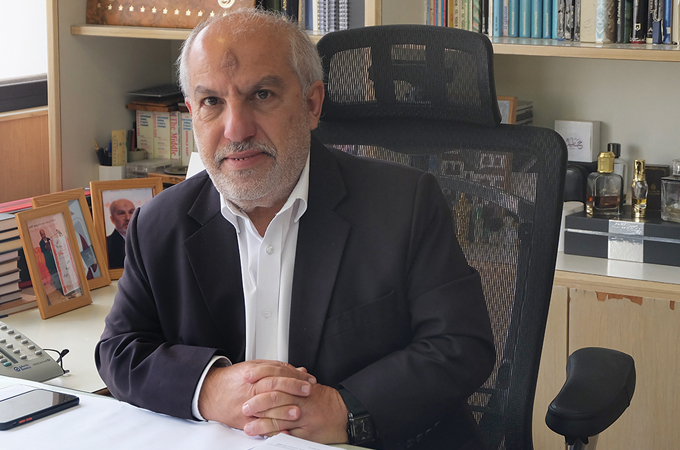
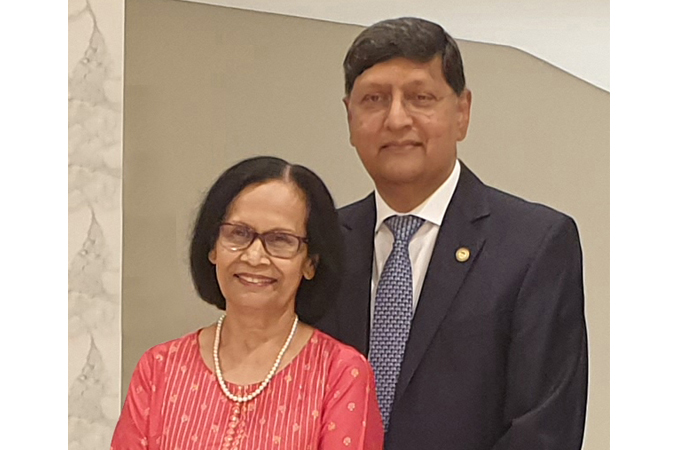
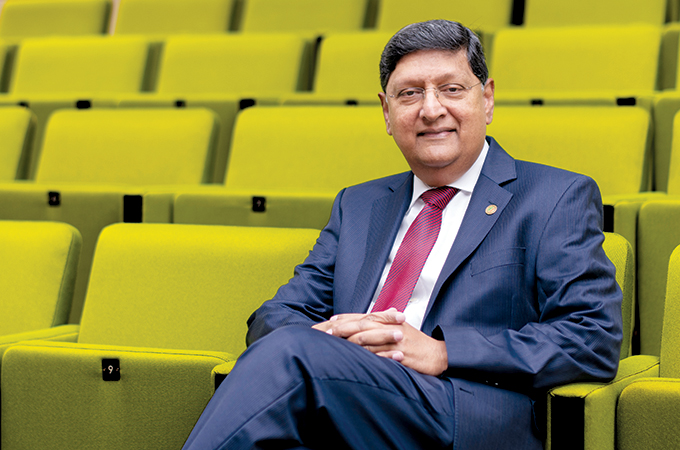
 B.jpg)
